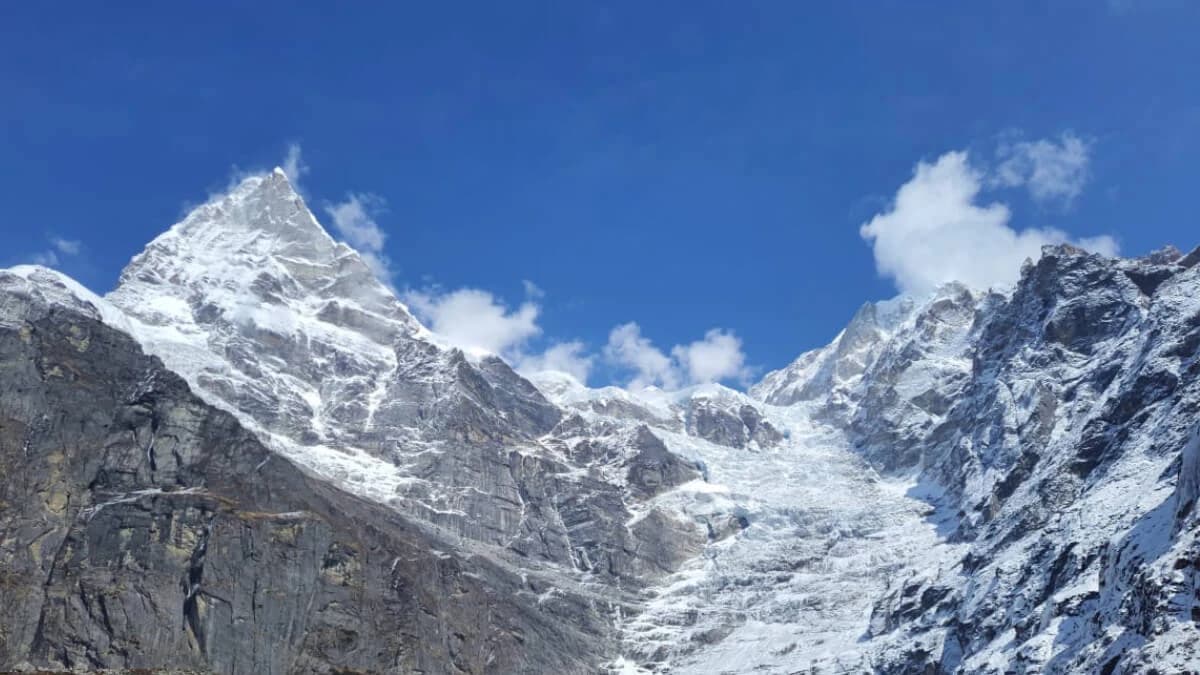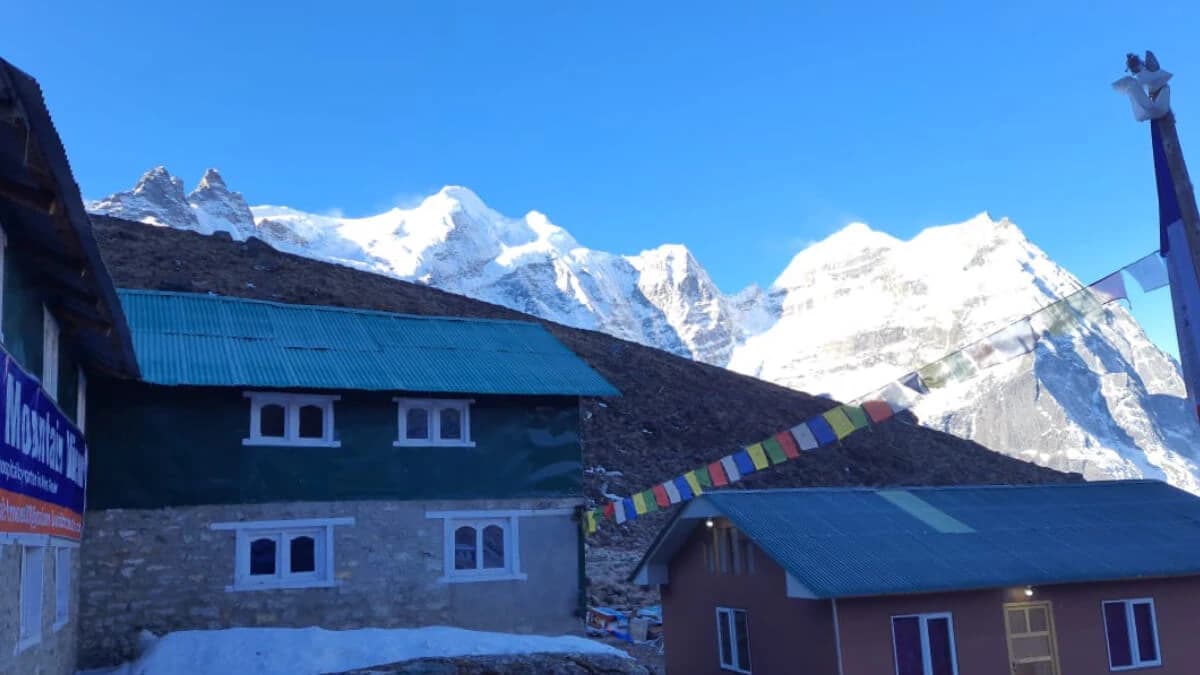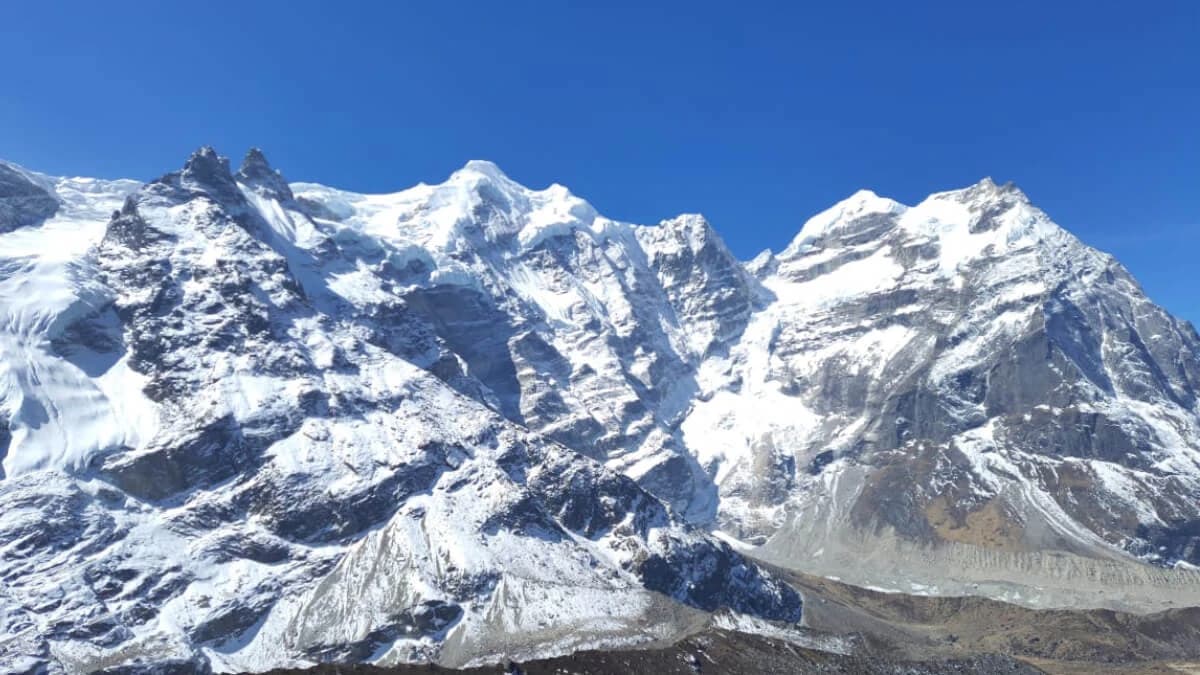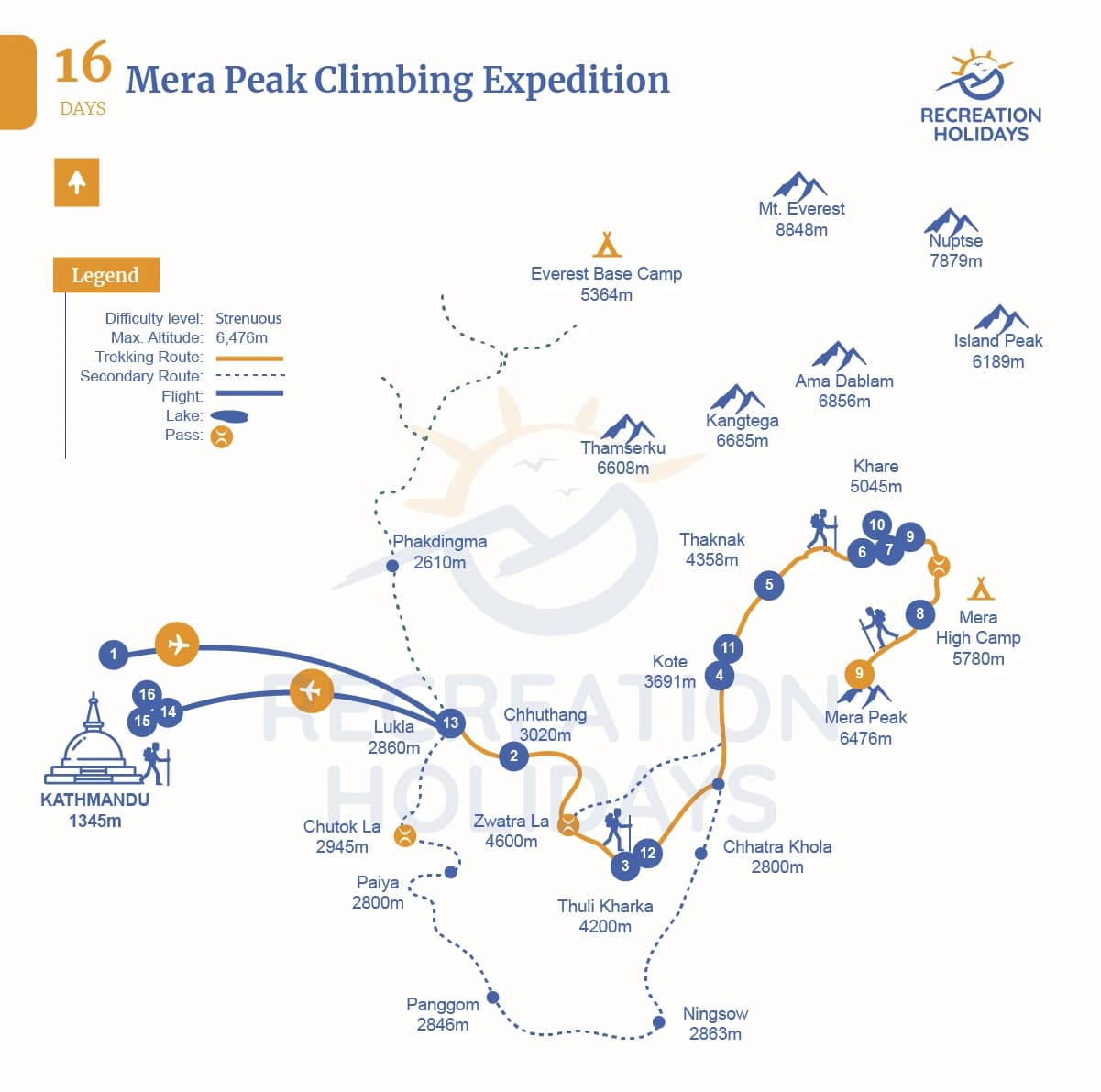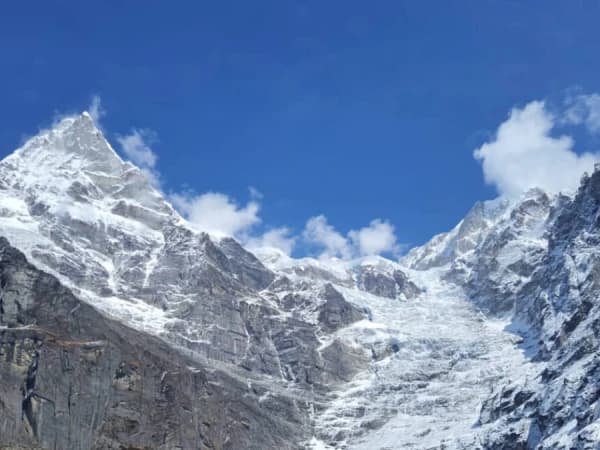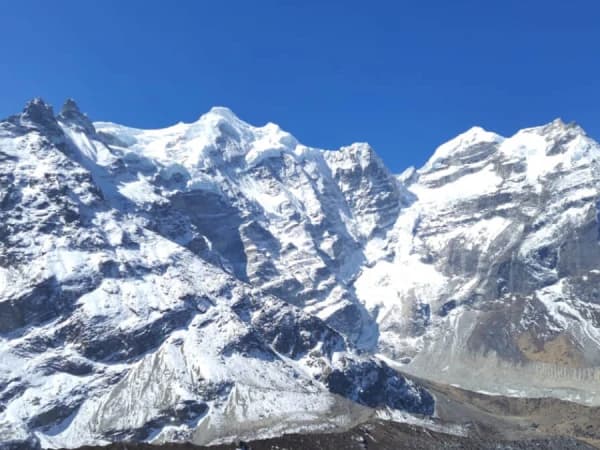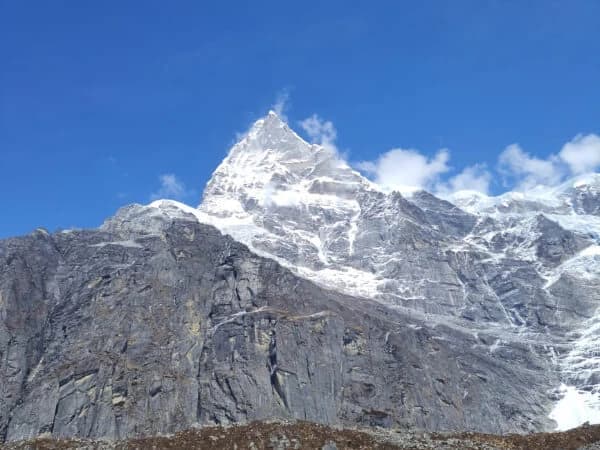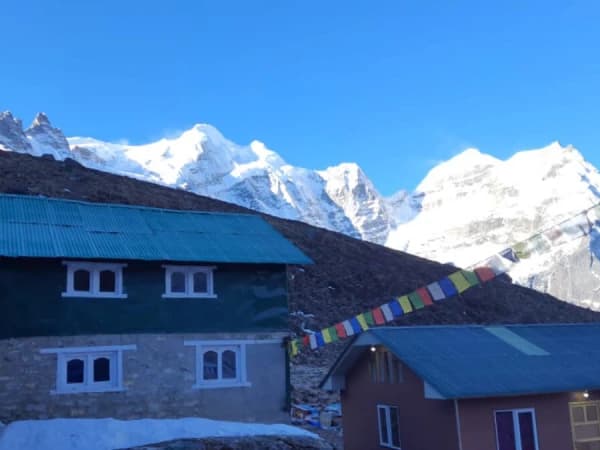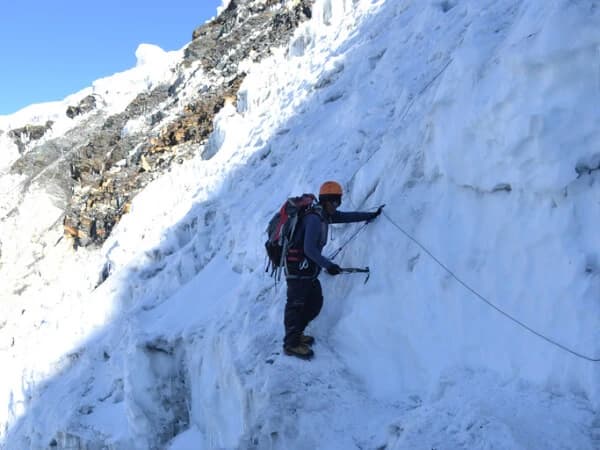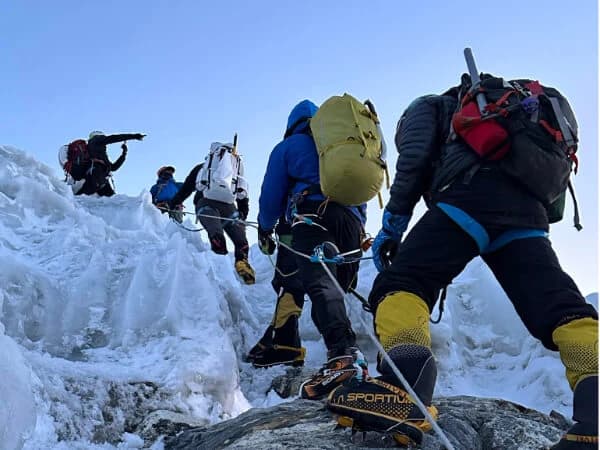16‑day Mera Peak Climbing Expedition reaches up to 6,461 m, offering a challenging high‑altitude adventure through the Khumbu region, combining technical sections with stunning Himalayan panoramas.
16-Days Mera Peak Climbing Expedition
Highlights of the Mera Peak expedition
- Conquer the highest trekking peak in Nepal
- Ideal for beginner climbers
- Experience the famous Lukla flight
- Enjoy adventure trekking in the pristine Hinku and Hongu Valley
- Follow the tranquil trekking route
- Cross Zatrawa La Pass
- Less crowded than Island Peak and Lobuche Peak
- Learn the basics of mountaineering
- A full day for sightseeing, shopping, and relaxation in Kathmandu after climbing
- Witness breathtaking landscapes and stunning mountain views throughout the trip
- The view of Everest, Lhotse, Makalu, Cho Oyu, and Kanchenjunga is incredible from the top of Mera Peak
- Push your limits and unlock a great achievement
Overview
“Do you want to climb a mountain in the Himalayas but don't want to spend two months or thousands of dollars? Are you looking to enter the mountaineering world but don't know where to start? Well, the answer to both these questions is Mera Peak climbing!”
Mera Peak is a trekking category peak in Nepal. In fact, it is the tallest trekking peak in Nepal with a height of 6,476 meters. It is located in the Makalu Barun National Park, south of Mt. Everest.
*Trekking peaks are known as beginner-friendly peaks under 7,000 meters. These peaks are not technically advanced, do not require weeks of acclimatization, and are quite affordable to climb.
Climbing Mera Peak is perfect for trekkers who have done treks such as Annapurna Circuit, Manaslu Circuit, Everest Three Passes, etc. If you are someone who has done these treks and is looking for something bigger, consider the Mera Peak climb.
You do not need actual mountain climbing experience to join the Mera Peak climbing with us. We welcome beginner climbers with no mountaineering experience because we teach them the basics of climbing and help them conquer the peak.
Climbing Mera Peak is not an easy endeavor. It will break you, especially if you are not physically and mentally ready. However, with proper preparation and support, climbing this peak will truly change your life.
Upon reaching the top of Mera Peak, you will behold an unbelievable panoramic view of some of the tallest mountains in the world, including Everest (the 1st-highest), Kanchenjunga (the 3rd-highest), Lhotse (the 4th-highest), and Makalu (the 5th-highest).
Mera Peak Climbing Is the Best Beginner Mountaineering in Nepal!!
What is it like climbing Mera Peak?
We fly into Lukla airport and begin our five-day hike to Khare. Khare will be the base camp for Mera Peak. From here, we will climb Mera La Pass to Mera Peak High Camp and push for the central summit of Mera Peak.
You will be climbing with a team led by a Sherpa leader who has a proven track record on Mera Peak. Not only that, but our Mera Peak Climbing acclimatization profile also has a high success rate.
As we all know, mountains make their own weather, so we also have a spare day just in case our summit day gets affected by bad weather. The technical challenges are very few on Mera Peak.
However, it involves strenuous climbing on snow slopes and glaciers and includes some short, steep 35° sections. Climbers have to use crampons, ropes, ice axes, etc. We provide our climbers with pre-climbing training at Khare.
It helps them learn the basics of mountaineering and the gear they will use. Overall, by following our Mera Peak Climbing itinerary and team, you will safely and successfully conquer this peak.
Journey from Lukla to Khare- our Mera Peak Base Camp
The Mera Peak climbing journey begins in Kathmandu. It is the capital of Nepal. From here, you will take a short flight to Lukla Airport. Lukla is the gateway to the Everest region, where Mera Peak is situated.
From Lukla, you will begin trekking. The first day of the hike will take you to Chhuthang. The next day, you will cross Zatrwa La Pass (4,600 m) and descend to Thuli Kharka to spend the night.
You will enter the exclusive Hinku Valley and walk through lush forested hills to Kothe. After a night in Kothe, you will gradually ascend to Thangnak. Explore Lungsumgba Gompa, an ancient monastery on the way.
Thangnak onwards, you will slowly leave the treeline behind as you traverse the lateral moraine of the Shar Glacier and Hinku Nup and hike to Khare. Khare is our base camp for Mera Peak.
After the Mera Peak summit
After you reach the summit of Mera Peak, you will spend some time enjoying the views and descend to Mera High Camp. At the high camp, you will pack your duffel bag and descend to Khare to sleep for the night.
We will have a small celebration at Khare. Then, you will trek for three days to descend to Lukla. On the way, you will spend a night in Kothe and Thuli Kharka. You will also re-cross the Zatrwa La Pass.
Mera Peak facts and climbing tips
- Mera Peak has three summits- Mera North (6,476 m), Mera Central (6,461 m), and Mera South (6,065 m). You will climb Mera North, the highest on this trip.
- Mountains make their own weather. Be prepared for all types of weather.
- The trail from Lukla to Khare is offbeat. You have to be attentive while trekking and maintain a steady pace.
- Preserving energy is the key to successfully completing this climbing voyage. Rushing will lead to altitude sickness.
- Maintain your body hydration. Drink ample water and fluids like soups and ginger-honey teas.
- Listen to your body. If you feel sick or any kind of discomfort, share with your guide. We have planned a contingency day in our itinerary. So, you will not fall back. Instead, we will help you recover and get back on the mountain.
- As you ascend above Khare, every step will get heavy because of the high altitude. Even the veteran climbers get slow. It's normal. You are not failing.
- Listen to your guide's instructions carefully. Do not ignore him. It could make the difference between life and death.
Mera Peak climbing difficulty
Mera Peak climbing difficulty is Alpine PD+. It means that climbing this peak is physically very demanding but technically not challenging. So, Mera Peak is ideal for beginner climbers who want to get into mountaineering and wish to hone their climbing skills.
Before reaching the base camp, you will spend a few days hiking through varying terrain and altitude. One of the first challenges you will come across is crossing Zatrwa La Pass. You will cross this pass on the second day of hiking to enter Hinku Valley.
Walking 6 to 7 hours a day uphill and downhill requires a lot of effort and energy. Therefore, you have to be in good shape. With the rise in elevation, every step will get heavy. But you have to keep going.
The reason we make climbers trek for five days before reaching Khare (base camp) is to acclimatize and warm up before climbing begins. Beyond Khare, you will spend a night at Mera High Camp and push to Mera North summit.
The climbing part is definitely the most demanding part of this trip. Walking on snow slopes at very high altitude and in a cold climate is easier said than done. Your body and mind will be extremely challenged.
Is the Mera Peak climbing 16 days suitable for you?
- This is your first time climbing a mountain. The less technical climbing route of Mera Peak lowers the risks of crevasse fall and increases the chance of summit.
- You have done a handful of treks in Nepal and are questioning yourself about what's next. Mera Peak climbing could be your next chapter in the Himalayas.
- You are a veteran climber and are looking for a peak to warm up before climbing a bigger and tougher mountain.
- You are physically and mentally strong.
Training for Mera Peak
Do not underestimate the challenges of climbing a peak in the Himalayas. If you want to not just reach the summit but also enjoy the climbing journey, you have to be in good shape. So, start preparing physically for Mera Peak climbing early.
Below, we have shared a few tips that will help you get physically ready for Mera Peak:
- Stamina and endurance: Improve your stamina and endurance. Regular cardio and high-intensity activities such as running, swimming, and cycling are recommended.
- Strength: Build your core strength. Strength/resistance training should be part of your workout routine. You have to strengthen your legs, back, and shoulders.
- Trek/hiking experience: If you have not trekked before and are aiming to climb Mera Peak as your first adventure in the high mountains, consider doing a few-day hikes and short treks. It will help you immensely.
- Long walking: Go on a regular long walk with a backpack weighing 5 to 10 kg. It will train you to walk long hours with a weight.
- Mental preparation: Mera Peak climbing also tests you mentally. Adventure in remote regions comes with many discomforts, adjustments, and compromises. You have to go out of your comfort zone, and if you are not mentally prepared, it will only affect your journey. So, research about Mera Peak climbing, practice breathing, have a positive mindset, and understand the limitations of the Himalayas.
- Technical expertise: Not required.
- High-altitude experience: Needed.
Mera Peak climbing season
Climbing a peak in the Himalayas requires stable weather and good route conditions. Spring (March to May) and autumn (late September to November) have the best climbing conditions in the entire year. So, these two seasons are the best times to do Mera Peak climbing.
Spring (March to April):
If you love snow or want to see mountains covered in snow, then March and April will be the perfect time for Mera Peak climbing because it is the end of winter. March and April are also ski seasons.
Autumn (late September to November):
Likewise, October and November are other great months with brilliant visibility, mountain vistas, and trail conditions.
If you are interested in Nepalese culture and festivals, October and November are the ideal times to travel to Nepal.
These are festival months in Nepal. Note that the snow will be less in these two months, but the autumn scenery is incredible too.
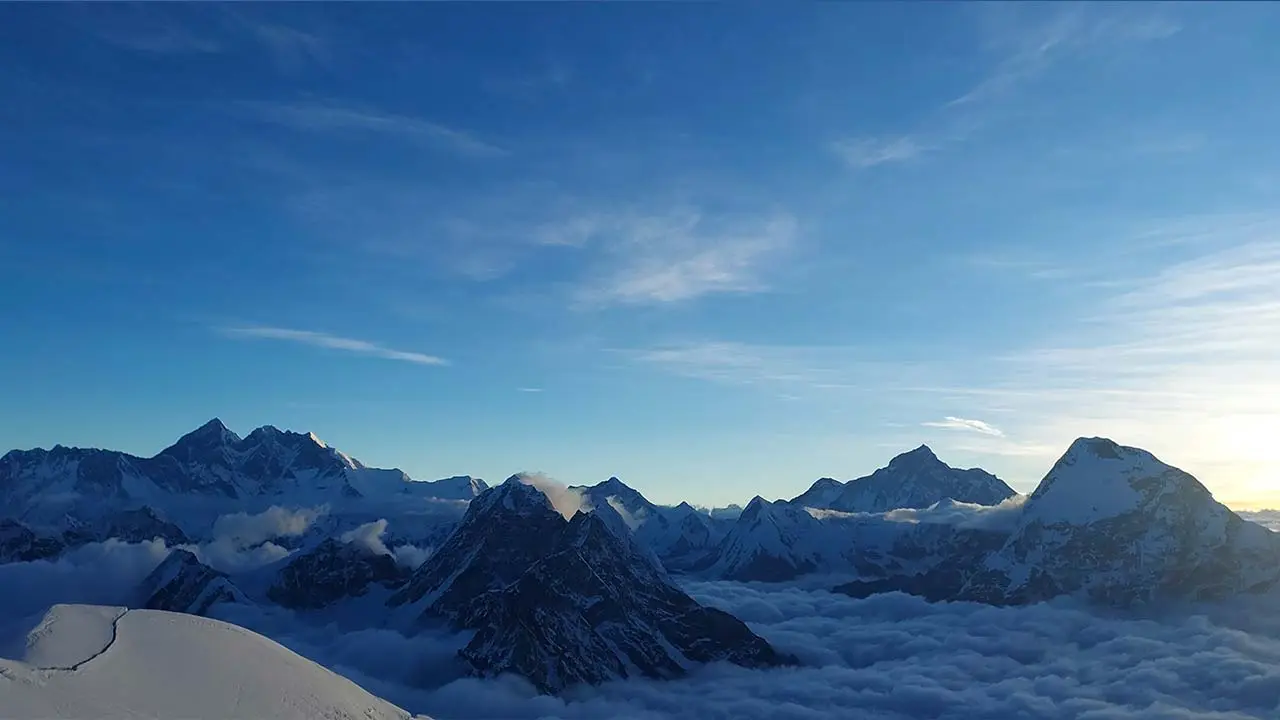
Mera Peak support team
Climbing a peak in the Himalayas is a team game, not only on the mountain but from the day you book the trip. Our management team is based in Kathmandu.
They take care of Mera Peak climbing permits, logistics, transportation, and arrange guides and porters. Our on-field crew (guide and porter) treks and climbs the peak with you.
So, from the very first day of the trip, you will be supported by professional travel consultants who have many years of expertise.
One of our team members will thoroughly explain to you the program, things you should know about Mera Peak climbing, physical and mental preparation, packing, and answer all your questions.
From the moment you land in Kathmandu to the very end of the journey, we will accompany you!
- Our management team in Kathmandu arranges logistics, permits, transportation, and a guide and porter.
- You will climb with a Sherpa leader who has a proven track record on Mera Peak.
- Supported by an additional crew who will take care of duffel bags, setting up tents, and cooking food at Mera High Camp.
- All of our crew can speak English. If you can't speak English, we will provide someone who can speak your language.
Mera Peak climbing cost
Our Mera Peak climbing cost is the best in the market. The service we provide for this price is unbeatable. Our package cost starts at USD 2,500 per person. However, if you are in a group of two or more climbers, you can get an additional discount per head.
We have shared our Mera Peak climbing price for different group sizes below:
| Climbers | Packages Cost | Book Here |
| 1 | USD 2500 per person | |
| 2-4 | USD 2140 per person | |
| 5-8 | USD 2050 per person |
Why climb Mera Peak with Recreation Holidays?
Recreation Holidays has been organizing Mera Peak climbing for many years. We have perfected our Mera Peak climbing itinerary to provide the best acclimatization opportunities and achieve the highest success rate.
Likewise, our Mera Peak climbing team has become the most trusted partners in the field given their many years of expertise.
We know the mountains, we know the Mera Peak. You can climb safely, confidently, and hassle-freely with us.
Our team practices 100% safety guidelines. They will be pushing to reach the summit, but not at the cost of your life.
By choosing Recreation Holidays for your Mera Peak climbing expedition, you can expect the finest service and climbing partner.
Below, we have shared the perks of climbing Mera Peak with us:
- Led by veteran Sherpa leaders who have a proven track record on Mera Peak.
- Our acclimatisation profile is recommended by the International Mountaineering and Climbing Federation.
- We have a contingency day in our itinerary to back up bad weather or delays.
- Our Mera Peak climbing 16-day package is customizable.
- Get the best Mera Peak climbing price with us.
- Trained and experienced team to handle every aspect of the trip.
- We take Mera Peak climbing not only as an adventure but also as an opportunity to teach and introduce mountaineering to aspiring climbers. So, we provide pre-climbing training and much useful information on mountaineering.
- We travel responsibly and ensure our trips benefit local mountain communities.
- Our package includes climbing equipment. So, you do not have to worry about buying expensive summit suits, crampons, ropes, etc.
16-Days Mera Peak Climbing Expedition Itinerary
We do everything in our control to follow our Mera Peak climbing itinerary.
However, given the unpredictable weather conditions in the mountains, chances of vehicle breakdown, and climbers getting sick or hurt, there can be changes.
To ensure the best climbing experience, our leaders make decisions that align with the group's interests and safety if needed.
We will pick you up from the international airport on your arrival day. You do not have to worry about how you will get to your hotel. Our team will escort you in a private vehicle.
After checking in at the hotel, spend some time resting. Later, we will meet for a trip briefing, and you can spend a few hours doing last-minute shopping and packing duffel bags.
The Mera Peak climbing adventure begins today. You will leave for Ramechhap Airport at around 1:00 AM. It takes around 4 to 5 hours of driving. You will take an early morning flight to Lukla.
The Lukla flight will be short, but the mountain views you will see in that short time are out of this world. Upon landing in Lukla, porters will join the group, and you will begin trekking to Chutang.
The trail from Lukla to Chutang follows a scenic route. You will walk through rhododendron and pine forests, crossing many suspension bridges on the way.
*In spring and autumn, Lukla flights are operated from Ramechhap Airport instead of Kathmandu Airport because of high traffic. It lowers flight delays and keeps travelers on their schedule.
We know it is just the second day of walking, and you are about to cross a mountain pass. Crossing this pass will expose you to an altitude above 4,00 meters, which is great for acclimatization.
Usually, on the days when you cross a mountain pass, you begin trekking as early as possible. The goal is to cross the pass before the midday strong wind hits the region.
Following your guide's lead, you will walk through densely forested hills and gradually ascend to the top of the pass. Navigating a few sections requires extra attention, so be careful.
From the top of the pass, you will see breathtaking mountain vistas of Kongde Ri, Numbur Himal, Lumdung Himal, etc. After that, you will descend to Thuli Kharka.
As you continue trekking beyond Thuli Kharka, you will enter the deeper area of Hinku Valley. The views, climate, and vegetation are much more exotic and pristine.
Follow a downhill trail that extends to the banks of the Hinku River. You will then traverse a rocky section and ascend and descend through lush pine and rhododendron hills.
On the way, you will see beautiful views of Mera Peak and other surrounding mountains. The trail is quite scenic, so you will enjoy walking. Soon, you will move ahead on the western side of the valley and hike to Kothe.
Unlike the last few days, the trail widens. You will trek following the bank of the Hinku River. The views of the snow-covered mountain along the way are excellent. You will also explore an ancient monastery called Lungsumgba Gompa.
As you ascend to Thangnak, the change in landscape becomes much more obvious. You have left densely forested hills behind and are now walking through high-altitude pastures covered with junipers and wildflowers.
You will ascend above 5,000 meters today. This gain in elevation will definitely be heavy on your body. Make sure you keep yourself hydrated and energized throughout the way.
Leaving Thangnak, you will ascend along the river and go over the bed of a rocky deposit to Sabai Tsho. It is a glacial lake. The trail then traverses lateral meadows towards the Shar Glaciers and Hinku Nup.
You will continue trekking through rugged terrain and reach Khare. Khare will be our base camp for Mera Peak. You will meet with your climbing guides in Khare.
This acclimatization day is essential to get used to the environment above 5,000 meters and also prepare for the climbing phase. You will wake up early in the morning and go on an acclimatization hike with your guide.
Return to Khare after the hike and rest for a bit. Later, we will do pre-climbing training. We will share the climbing route conditions, safety tips, and teach you how to use the equipment.
From Khare, we will climb to Mera Peak High Camp. If there is snow on the path, you will use crampons. You will ascend towards the southern face of Mera Peak.
The climbing route goes through the icy moraine of glaciers. We will set up the tour with safety ropes that you will use to climb up and down the mountain.
Soon, you will climb Mera La Pass along the ridgeline and reach 5,350 meters. Many climbers make their base camp at this altitude. From here, you will follow gentle snowy slopes with a few crevasses to Mera Peak High Camp.
Our support team will set up the tents. You will rest here for a few hours before the summit push. We will provide warm meals and beverages at high camp to keep you energized for the final push.
If the weather is fine, you will push towards the Mera Peak summit on this day. We will begin climbing at around 1:00 AM or 2:00 AM.
We climb at this time because the weather in the mountains becomes much harsher and more unpredictable in the daytime. So, we push for a summit between 1:00 AM and 2:00 AM and return on time.
From Mera High Camp to the summit, it will be around three kilometers of climbing. We will climb for quite a long time, and just before 100 meters to the summit, we will use ropes.
Upon reaching the top of Mera Peak, we will see giant mountains poking out of the clouds all around us. It includes the five tallest mountains on Earth. After enjoying the view, you will descend to the high camp.
Pack your duffel bags at high camp and descend to Khare for the night. We will have a short celebration at Khare.
This reserve day will be used if we can't push for the summit as we have planned due to bad weather or any other reason. If everything goes as per our plan, you will have one full day in Kathmandu.
Although climbing has ended, you still have three days of walking ahead of you to return to Lukla. On this day, you will descend to Kothe via Thangnak. The route will be the same as before.
After breakfast, start retracing your steps back to Thuli Kharka. Enjoy stunning scenery on the way.
You will re-cross Zatrawa La Pass. It is the shortest way back to Lukla from Thuli Kharka. Start ascending the pass early in the morning and descend to Lukla to spend the night. Beautiful mountain views will keep you company along the trail.
You will take a flight back to Kathmandu early in the morning. You will land at Ramechhap Airport. Our team will pick you up from here and drive you to Kathmandu. The remaining day is free.
You have one full day in Kathmandu. You can have a post-climbing massage and spa session. Likewise, it's a great opportunity to explore some tourist sites in Kathmandu and buy souvenirs.
In the late evening, we will catch up over a farewell dinner. We will share the highs and lows of the trip and give you a climbing certificate.
Concluding your remarkable Mera Peak climbing expedition, a representative from Recreation Holidays will accompany you to the International Airport for your final departure. It's essential to arrive at the airport at least 3 hours before your scheduled flight departure time.
As you bid farewell to Nepal, reflect on the extraordinary experiences and breathtaking landscapes you've encountered throughout your journey. Take with you cherished memories of your adventure in the Himalayas and the camaraderie shared with fellow travelers.
Accommodation and meals are not provided on this day as you prepare to embark on your homeward journey. Use this time to appreciate the journey's lessons and the bonds forged amidst the mountains, carrying their spirit with you as you return home.
Trip Service Details
Includes
- Airport Transfers: Pick-up and drop-off on your arrival and departure dates by private vehicle.
- Meals: All meals (breakfast, lunch, and dinner) during the trek and climb.
- Permits: National Park entry and climbing permits.
- Airfare: Round-trip flights between Kathmandu and Lukla, including airport transportation.
- Guides: One trekking guide for the duration from Lukla to Lukla and one climbing guide from Khare to Khare, both licensed by the Nepal Mountaineering Association (NMA).
- Staff Support: Includes staff salary, insurance, equipment, domestic airfare, food, and accommodation.
- Accommodation: 9-10 nights in tea houses during the trek and 2 night in a tent at high camp during the climb.
- Equipment: Group mountaineering (climbing) equipment.
- Additional Inclusions: All government and local taxes, trekking map, trip achievement certificate if needed, Ef-Chlor water purification tablets, farewell dinner in a Nepali restaurant in Thamel, and free luggage storage at Recreation Holidays Store during the trek.
- Airport Transfer: On your departure day as per your flight schedule.
Excludes
- Visas and Flights: Nepalese visa fee and international airfare to and from Kathmandu.
- Excess Baggage: Charges apply if your luggage exceeds 15 kg, approximately $1.5 per kg.
- Meals in Kathmandu: Meals in the city are not covered except for the farewell dinner.
- Personal Expenses: Such as phone calls, internet, laundry, bar bills, battery recharge, extra porters, purchased or boiled water, showers, etc.
- Porter Services: If required, a porter shared between two trekkers can be hired for USD 280.
- Personal Climbing Gear: Any specialized personal climbing equipment and guide services if requested.
- Gratuities: Tips for guides and porters are expected and not included in the package price.
Dates & Availability
Additional Info
Mera Peak climbing permits & regulations
You will need the following permits for Mera Peak climbing for 16 days:
- Local Area Permit fee: Nrs 2000 per person
- Makalu Barun National Park Permit fee for SAARC nationals: Nrs 1,500 per person
- Makalu Barun National Park Permit fee for other nationals: Nrs 3,000 per person
Mera Peak Climbing permit in different seasons for foreigners:
- Spring: USD 250 per person
- Autumn: USD 125 per person
- Winter: USD 70 per person
- Summer/monsoon: USD 70 per person
Mera Peak climbing in summer/monsoon (June to August):
June to August is the summer time and rainy season. Trekking is quite demanding in these months because of the bad trail conditions.
The mountain views are also not great, and most importantly, summer heat softens the snow on the mountain and makes it impossible to cross using crampons.
So, we do not recommend Mera Peak climbing between June and August/mid-September.
Mera Peak climbing in winter (December to February):
Some trekkers also climb Mera Peak in the winter season. However, winter summits are more challenging and risky. The snowfall can get too heavy, there can be whiteouts, snowstorms, etc.
How to acclimatize and handle altitude sickness during Mera Peak climbing?
We have designed our Mera Peak climbing itinerary to provide an ample acclimatization period to our climbers. You will trek for five days before reaching Khare, which will be our base camp.
During these five days of hiking, you will experience different altitudes, which will help you acclimatize. Likewise, at Khare, you will spend two nights and go for an acclimatization hike.
From Khare, you will climb to Mera Peak High Camp and rest there before pushing to the summit. This is our acclimatization strategy for Mera Peak climbing.
In addition to that, our guide will actively monitor your health and provide you with first aid in case any symptoms show. We recommend climbers follow the advice below to further lower the risk of altitude sickness:
- Be aware of the early symptoms of altitude sickness, which are headache, nausea, vomiting, dizziness, loss of appetite, trouble sleeping, and breathlessness.
- Treat the symptoms of altitude sickness before ascending further. If the symptoms progress, it can lead to HAPE and HACE, which is deadly.
- Ascend slowly and maintain a steady pace.
- Drink 2 to 3 liters of water daily. Replenish yourself with additional fluids like dal (lentil soup), ginger-honey teas, soups, etc.
- Limit caffeine intake and avoid alcoholic drinks and smoking.
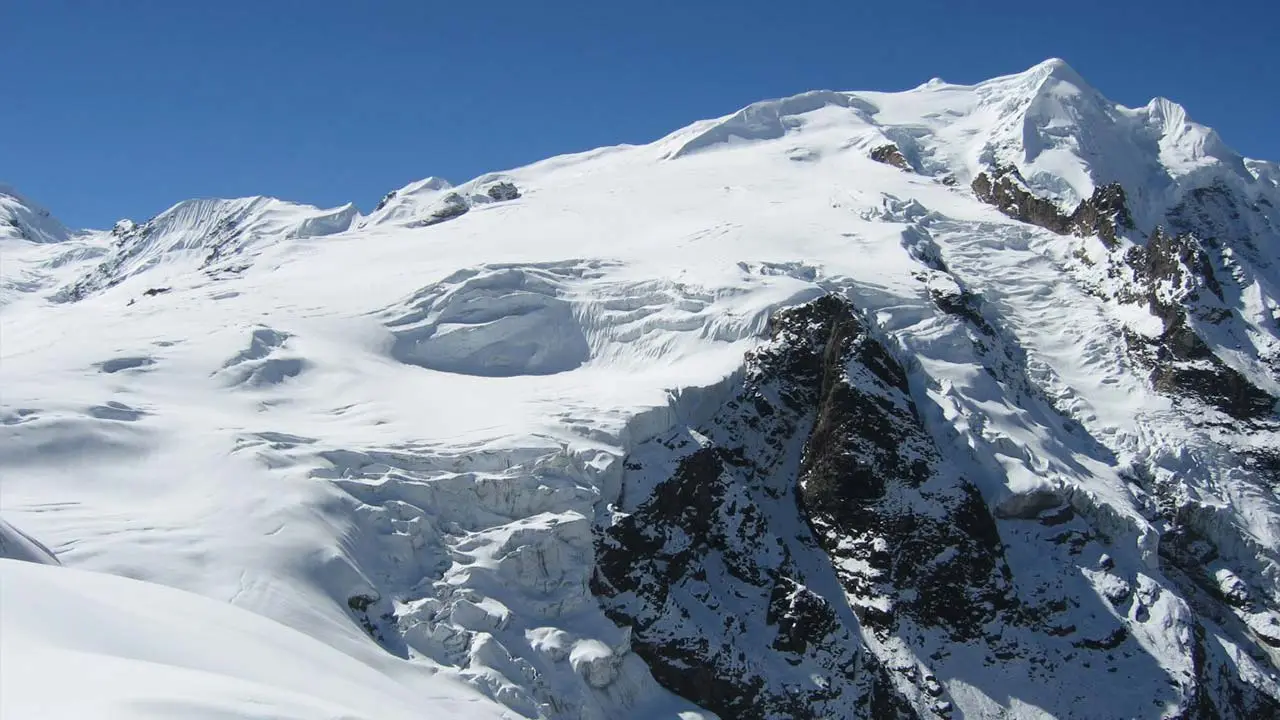
Mera Peak emergency and evacuation
During Mera Peak climbing, if any unseen event happens that requires you to immediately return to Kathmandu, we will air evacuate you in a helicopter.
Likewise, provide helicopter evacuation and rescue if you get sick or hurt while climbing. Your travel insurance will cover the evacuation expenses, so make sure you get a good one.
We work with a professional rescue provider who has experience on Mera Peak!
Accommodation during Mera Peak climbing
We provide accommodation in a nice three-star hotel in Kathmandu. Breakfast will be included in your room service.
During trekking, you will spend nights in tea houses run by villagers along the trail. The teahouse accommodation is simple. Twin shared rooms, communal dining areas, and washrooms made outside are standard practice.
Many places have Western-style toilet facilities, but you may also have to use squat toilets in some teahouses. It is best that you make up your mind about both kinds of toilets. We can book you single rooms if you pay extra money.
Tips:
- You will need a high-quality sleeping bag that is ideal for below -10°C.
- The WiFi and mobile network are not that good on the Mera Peak route. So, be ready to spend time in nature and socializing with fellow trekkers and the locals.
- Charging and hot showers cost extra money in the teahouse. You can expect to pay up to Nrs 300 for charging and Nrs 500 to Nrs 700 for a hot shower.
- Power banks and extra batteries are recommended for backup.
- Charging, hot shower, and WiFi service charges are your personal expenses and not covered by our Mera Peak climbing cost. So, kindly carry ample money for the journey. USD 10 to USD 15 is a good budget for daily personal expenses.
Camping at Mera High Camp
At Mera Peak High Camp, you will spend a night (or at least a few hours before the summit push) in an alpine tent. We provide sturdy alpine tents and other camping essentials.
Our support crew will take care of setting up the tents and other things. We will also make a dining tent and a toilet tent. Note that you will not have access to a shower at Mera High Camp.
What will you eat on this trip?
During Mera Peak climbing, you will have simple but filling and delicious meals. As you trek deeper into the Hinky Valley, you will mostly be greeted with local flavors and dishes.
Momo, dal bhat, thukpa, noodles, fried rice, soups, porridge, and eggs are some of the go-to food items you will have during the trip. In addition to that, many places will also have options like curry, stew, meat dishes, pasta, pizza, pancake, pudding, etc.
You have to carry snacks such as a protein bar, nuts, etc. These are great for a quick munch if you get hungry while walking or feel like eating something late at night.
Drinking water:
Most importantly, you will have access to clean drinking water during Mera Peak climbing. Boiled water is available at a fraction of the price in every village.
Carry water purification tablets for backup, one 2-liter water bottle, and one flask water bottle. A flask water bottle is great to carry warm tea or soup for the trail.
Food at Mera High Camp:
At Mera High Camp, we will provide you with delicious meals and snacks to keep you in good shape for the summit push. Our crew will prepare hot meals, teas, and warm water for you.
Tips:
- If you have any food allergies, let us know ahead of time so that we can curate the meals. In addition to that, make sure to be attentive to what you eat during the trip.
- Buy ample snacks, electrolytes, etc in Kathmandu. There are not many snack options along the trail, and the price of everything is more than triple.
- We do not recommend buying plastic water bottles during trekking. It is not good for the environment.
Mera Peak climbing travel insurance
You must have travel insurance that covers medical bills and helicopter evacuation for the Mera Peak climbing. Buy an appropriate travel insurance with these two coverages before leaving your country.
Make sure your insurance supports climbing in Nepal. Bring the insurance documents with you. You have to submit it to us before the Mera Peak climbing begins. We use travel insurance in case we have to provide emergency rescue.
We also recommend travelers to cover injuries during climbing, lost/stolen baggage, trip cancellation, and flight cancellation in their travel insurance for Mera Peak climbing.
Transporation
The following transportation is included during the Mera Peak climbing:
*Note that all transportation will be arranged as per our Mera Peak climbing itinerary. Any extra transportation request will cost additional money.
- Airport pick up and drop off: We provide complimentary airport pick up and drop off. Our team will pick you up from the Tribhuvan International Airport on your arrival day and also drop you off on time on your departure date.
- Lukla flight departures: We have two flights between Kathmandu and Lukla. Our team will drop you at the Ramechhap Airport on time for your Kathmandu to Lukla flight, as well as bring you back to Kathmandu after returning to Ramechhap Airport.
- Private car during guided sightseeing in Kathmandu: After you return to Kathmandu, you will have one full day in the city. If you choose to do a guided sightseeing tour of the city, we will provide a private car and driver.
Lukla flights
The Mera Peak climbing starts and ends in Lukla. You will take a short 30 to 35-minute flight from Lukla to Kathmandu.
In the spring and autumn seasons, the Lukla flights are operated from Ramechhap Airport. Whereas in summer/monsoon and winter, the Lukla flight is operated from Kathmandu airport.
It takes around 4 to 5 hours to drive from Thamel (Kathmandu) to Ramechhap Airport. Climbers usually leave their hotel between 1:00 AM and 2:00 AM.
Lukla flight delays
Due to unpredictable weather in the Himalayas, Lukla flights are frequently affected, resulting in delays and cancellations. It is very well-known information among travelers, and they prepare accordingly.
In case your Lukla flight gets delayed, you will take another flight on the same day. If your Lukla flight gets cancelled, you have an option to spend a night and take a flight the next morning, or you can pay additional money and upgrade to a helicopter flight.
A helicopter flight between Kathmandu and Lukla costs around USD 650 to USD 750 per person. So, you may have to pay an additional USD 500 per person to upgrade to a helicopter flight.
*Note that any additional expenses incurred due to Lukla flight delay/cancellation must be taken care of by the travelers.
Communication
Mobile network and WiFi connection are not good along the Mera Peak climbing route. Therefore, we recommend travelers to prepare their minds to go off-grid.
The team leader will have a satellite phone for emergency communication with us. Climbers may use a satellite phone to contact their family if needed. However, they have to pay extra money.
Additional expenses during Mera Peak climbing
Below are additional expenses you will come across during Mera Peak climbing:
- WiFi, hot showers, and charging in the mountains.
- Extra food and beverages in the mountains.
- Tips for the guide and porter.
- Lunch and dinners in Kathmandu.
- Shopping and souvenirs.
- Travel insurance.
- International flights to/from Kathmandu.
- Nepal travel visa.
- Any expenses that are not mentioned in our Cost Include section.
Nepal travel visa information
Travelers can easily apply for an on-arrival Nepal travel visa upon landing at the Tribhuvan International Airport in Kathmandu. Note that the on-arrival travel visa is not available for travelers from some countries.
Kindly check the Nepal travel visa status for your country on this page.
If you are from any of the restricted countries, you have to obtain the Nepal travel visa from the Nepalese Embassy or Consulate Office near you.
Our Mera Peak climbing package does not cover the Nepal travel visa fee. So, travelers have to pay for it themselves.
Mera Peak climbing packing list
You will need the following things for Mera Peak climbing:
Climbing Equipment
- Ice Axe
- Waist Leash
- Accessory Cord
- Microspikes
- Crampons
- Climbing Harness with two locking carabiners
- Standard Carabiners
- Belay Device
- Ascender

Footwear
- Liner Socks
- Synthetic or Wool Socks
- Double Boots
- Gaiters
- Light Trekking Shoes
Clothing
- Base Layer Bottom
- Long Sleeve Sun Shirt
- Breathable Pants
- Non-Insulated Pants
- Breathable Jacket
- Midlayer Top
- Non-Insulated Jacket
- Insulated Synthetic Pants
Handwear
- Liner Gloves
- Midweight Gloves
- Insulated Gloves
- Expedition Mittens
Headwear
- Buff
- Sun Hat
- Woolen Hat
- Glacier Glasses
- Ski Goggles
- Headlamp
Personal Equipment
- Mug
- Water Bottle
- Camera
- Extra Batteries
- Solar Power Bank
- Garbage Bag
- Sunscreen
- Lip Balm
- Hand and Toe Warmers
- Personal Medical Kit
- Water Purification
Note:
- We provide all camping equipment, so you do not have to worry about tents, fuel, etc.
- We provide a duffel bag to use during the trip.
- We provide many climbing gear, so you do not have to buy most of them.
- You can rent sleeping bags, daypacks, trekking poles, down jackets, etc, if you do not want to purchase them.
16-Days Mera Peak Climbing Expedition FAQs
You need travel insurance that covers high altitude helicopter evacuation from the Himalayas in Nepal. Make sure your travel insurance is good for peak climbing in Nepal, and if possible, also cover medical bills.
If your Lukla flight gets cancelled, you will wait for the next flight on the same day.
If there is no flight on the same day, you have the option to upgrade to a helicopter flight by paying extra charges, or you can spend a night near the airport and take the first flight the next morning.
Note that additional accommodation and meal expenses travelers have to manage by themselves.
For Mera Peak climbing, Recreation Holidays provides up to 20 kg weight limit per person during the flight onboard and during trekking carried by porter/yak/mules.
In the daypack, we recommend packing your documents, cash, and essentials that you will need while walking, such as a water bottle, snacks, SPF, sunglasses, chargers, etc.
To prepare for cold, fatigue, and isolation mentally, you have to experience these conditions firsthand. We recommend doing day hikes and short treks.
Yes, solo climbers can join the Mera Peak climbing with us. We have many fixed departures during the prime climbing seasons, so solo climbers will have many options. Likewise, you can also climb privately with us if you do not want to join a group.
Even if you have never climbed a peak before and you don't know anything about climbing gear, you can join the Mera Peak climbing with us.
However, the non-negotiable is that you must be fit and have previous trekking experience. We provide basic climbing training at Khare to our climbers.
You will learn to use climbing gear and many things about mountaineering.
Yes, you can see Mount Everest from the Mera Peak summit. Not only that, but you will also see Mt. Lhotse, Mt. Makalu, Mt. Cho Oyu, and Mt. Kanchenjunga from the Mera Peak summit.
On the Mera Peak summit day, you will leave the Mera High Camp at around 2:00 AM and begin climbing to the Mera North summit. The route will be secured with ropes, so you will use them to ascend and descend.
Upon reaching the summit, you will spend a few minutes enjoying the views and taking photos. Then you will descend to high camp, pack your stuff, and walk down to Khare.
Summit days are usually 9 to 10 hours long!
Once you go above Khare (the base camp of Mera Peak), you will be exposed to extreme alpine weather conditions. Early morning hours are usually calm, but as the day progresses, there are high chances of high winds and snowstorms. The weather is unpredictable, and the climate is very cold.
You have to use both a squat toilet and a western-style toilet during the Mera Peak climbing, so be prepared. Pack soap, toilet paper, etc.
The network along the Mera Peak route is not that good. You may get WiFi in some villages and a mobile network in some parts of the trail. We provide a satellite phone to our guide for emergency communication.
Yes, you can rent or buy climbing gear in Nepal. In fact, renting or buying climbing gear in Nepal will be the best choice because here you will get many excellent options and great prices.
We have made a thorough list of all the things, including climbing gear, you may need during the Mera Peak climbing at the end of our Useful Information section on this page. Kindly check that.
The symptoms of altitude sickness are headache, vomiting, dizziness, extreme fatigue, trouble breathing, insomnia, and loss of appetite. These are early signs. If these symptoms are not cured on time, they may progress to a severe form of altitude sickness, which is HAPE and HACE.
Mera Peak climbing is physically and mentally very challenging. Although it is a beginner-friendly peak, anyone planning to climb this peak must have strong trekking and high-altitude experience.
Our team leaders are trained to provide basic first aid. So, if you get sick or hurt yourself, we can provide standard first aid. If the climbers need medical assistance beyond first aid, we air evacuate them to our partnered hospital in Kathmandu.
The major challenges of Mera Peak climbing are high altitude and extreme climate. Likewise, the main risks of Mera Peak climbing are altitude sickness, poor weather, and getting hurt or sick during the climb.
You will need the following permits for Mera Peak climbing:
- Nepal Mountaineering Association (NMA) Permit for Mera Peak Climbing
- Local Area Permit
- Makalu Barun National Park permit
Solo travelers can either join our fixed departure group for Mera Peak climbing or climb privately with us. We usually have 4 to 8 climbers in our fixed departure groups.
Private trips are entirely designed to suit your time, fitness, and requirements. A professional climber and porter will accompany you during the climb.
In short, solo travelers are safe during Mera Peak climbing with us.
Climbing Mera Peak is not as expensive as climbing bigger mountains like Ama Dablam or Everest. Our Mera Peak climbing cost starts at USD 2,500 per person. This rate is for solo climbers. If 2 or more climbers join us, we provide special discounts as well.
During the Mera Peak climbing, you will spend nights in basic but comfortable teahouses till Khare. The teahouses offer affordable resting points for the trekkers on the Mera Peak route. At the Mera Peak High Camp, you will enjoy alpine camping.
Our "Mera Peak in 16 Days" package is designed to allow ample time for acclimatization, making your adventure more comfortable and reducing the risk of altitude sickness.
You will first fly from Kathmandu to Lukla. The journey begins from Lukla. You will hike to Khare. It will be around a 5 to 6-day hike.
There are two routes to Khare. One is the Hinku Valley route, which is longer but safer. Another is the Zatrwa La Pass route, which is shorter but more challenging.
Our itinerary follows the Zatrwa La Pass route, which keeps up with the adventure and is also great for high altitude exposure before reaching Khare.
No need to worry about heavy gear; Recreation Holidays provides all necessary mountaineering equipment for the climb. Personal and trekking gear should be brought by you, and rentals are available if needed.
The Mera Peak climbing itinerary may go from 16 to 18 days. We follow a 16-day program with an ample acclimatization period.
Supplementary oxygen is not typically required for Mera Peak. However, our teams are equipped with emergency oxygen supplies to ensure safety under all circumstances.
Spring and autumn are the best seasons to climb Mera Peak. April, May, October, and November are the finest times weather-wise. Similarly, some climbers also undertake winter ascents on Mera Peak.
Mera Peak has a high success rate of approximately 90%, thanks to its straightforward ascent. With proper preparation and training, most climbers can successfully summit.
Mera Peak has three summits- Mera North (6,476 m), Mera Central (6,461 m), and Mera South (6,065 m). Mera North is the true summit of Mera Peak. You will reach the top of Mera North on Mera Peak climbing.
Yes, from the summit of Mera Peak, climbers are rewarded with clear views of Mount Everest, along with other majestic 8,000-meter peaks such as Kanchenjunga, Lhotse, Cho Oyu, and Makalu.
The Alpine Grade of Mera Peak is PD+. It means it is physically very demanding.
While both peaks are considered suitable for beginners, Mera Peak includes some technical climbing and is situated in a high-altitude alpine environment, which can make it slightly more challenging than Kilimanjaro.
Mera Peak is not a technical climb. The climbing route is mostly snow slopes.
Typically, the Mera Peak expedition takes between 14 to 17 days, depending on the chosen itinerary. From the high camp, the summit push usually lasts about 5-6 hours.
No, previous climbing is not required for Mera Peak. In fact, Mera Peak is one of the best peaks in the Himalayas to start your mountaineering journey.
Mera Peak is an ideal starter climb for novice mountaineers, offering a chance to build experience in a relatively controlled high-altitude environment.
Travelers’ Review
The experience of trekking to Mera Peak with Recreation Holidays was absolutely unforgettable. The route was stunning and remote, the logistics were perfectly handled, and the summit day was nothing...
Climbing Mera Peak was one of the biggest challenges I’ve taken on, and I couldn't have done it without the amazing team at Recreation Holidays. From the guides to the...
My recent expedition to Mera Peak (6,476m) with Recreation Holidays was a truly unforgettable adventure. From the very beginning, this Nepal-based trekking company provided outstanding service, expert guidance, and a...

